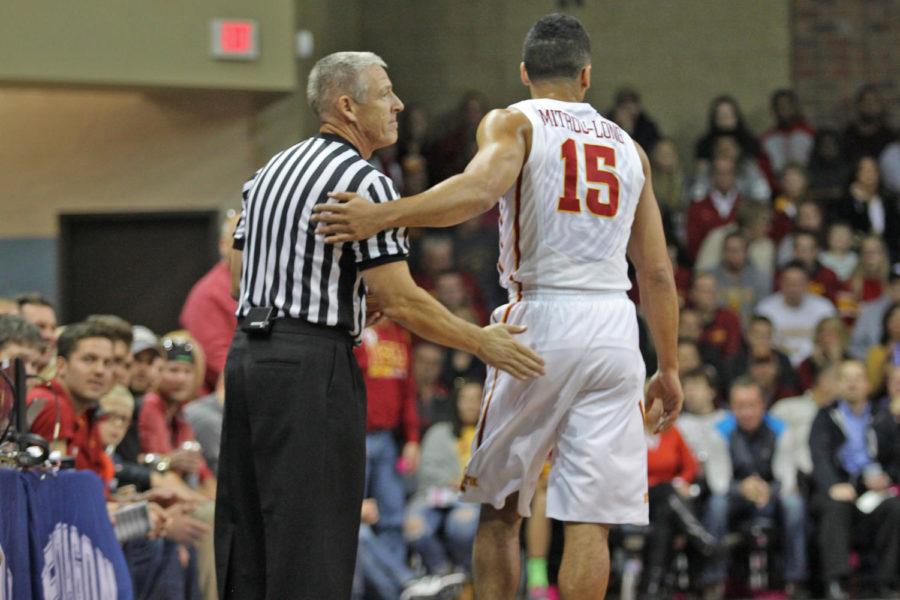The power of a name: Naz Mitrou-Long
December 3, 2015
Naz Long recently chose to do something most people only dream about — change his identity.
He didn’t vanish or retreat into shadow. Instead, his change came by way of addition, not subtraction. Specifically, the addition of six letters on the back of his ISU basketball jersey: M-I-T-R-O-U.
At 22 years old, Naz Long became Naz Mitrou-Long. And while it might not seem like much, it made a world of difference to someone who means the world to Naz.
“When he first told me, I was speechless, because it’s not something you ask of your kids,” said Naz’s mother, Georgia Mitrou. “When I actually saw it on his jersey, it touched me.”
The name Mitrou is of Greek origin, Georgia’s birthplace. It was important to Naz — a Canadian citizen who is half Trinidadian, half Greek and has three siblings as well as six half-siblings — to define himself; to represent every part of who he is while simultaneously thanking his mother for all she’s done.
“It means a lot to her. It means a lot to represent that side of the family, and it’s just a tribute to her,” Naz said. “I could never repay her for everything she’s done for me, but it’s a small token of my appreciation.”
The move is something Naz has publicized, making it clear to everyone through both word and action that Mitrou-Long is who he is now. But it wasn’t a “look at me move.”
“I don’t think he planned it for years. I think it just happened that he was at the age that he thinks more about what is right and what he should do,” Georgia said. “I know it was something he thought long and hard about and never discussed with anybody. It made me really proud of the young man he’s become.”
Naz hasn’t worn Mitrou-Long on his jersey since his first year playing basketball, long before attending high school in Canada and later in the United States.
But now, equipped with the national reputation of a starter on a top-five team, the gesture can create the desired impact and resonate across international borders.
“Every year, when I watch him on that stage, it’s still surreal,” said Naz’s father, Jersey Long. “I know there’s a lot of levels left to go, and I hope he has the capability of making it to the highest level.”
But just in case he doesn’t, Naz wanted to offer his tribute while still basking in the limelight of NCAA basketball.
The strategy has been effective, sending a clear value message to the woman who spent hours on the phone with him as he adjusted to American life as a 16-year-old prep school player.
“It actually helped me understand that he understood me and where I came from,” Georgia said. “I have twin brothers. They love Naz. They follow him, and they watch all his games. So for them as well, it was an amazing thing.”
Ann Oberhauser, professor of sociology and director of women’s and gender studies, said Naz’s decision is a high-profile example of a generational shift in attitudes about gender and surnames.
Because of that, Naz’s choice carries weight from a feminist perspective.
“It is happening more often with this generation — there just seems to be more of an acceptance and more possibilities and options for people,” Oberhauser said. “It reflects more respect and acceptance of both women and men.”
For most of history, when a woman married a man, she took his last name. There was no choice, no alternate perspective. It’s just what was done.
Female identity and heritage aren’t necessarily swallowed up symbolically through marriage and the changing of one’s name, but they can be to an extent. That suppression isn’t limited to the wife either, but also to the persistence of her identity as reflected in how her children are understood and identified.
Oberhauser didn’t assert that a woman must keep her name, hyphenate it or pass it along to her children to remain her own person. She explained, rather, that it’s the choice that is key. The lack of societal expectations and the existence of options where names are concerned are what matter most.
Because, as Naz Mitrou-Long has demonstrated both culturally and in relation to gender equality, much power resides in the name one chooses to carry.
“Names are very important,” Oberhauser said. “A person’s name, they have it their whole life.
“That’s how other people know them.”







